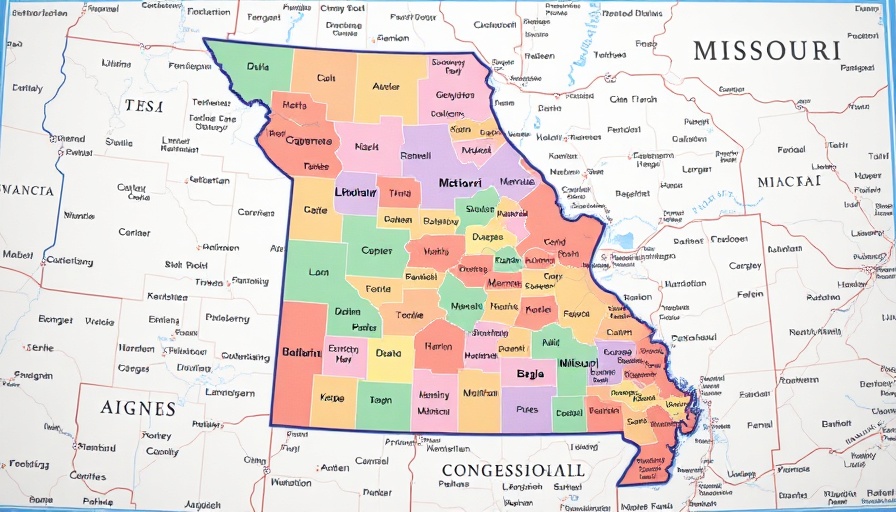
Will Redistricting Transform Missouri Politics?
The state of Missouri is experiencing a political upheaval over the prospect of redistricting. If Governor Mike Kehoe calls a special session to reshape Missouri’s congressional map, as some are urging, it could alter the balance of power heading into the vital 2026 elections. This proposal comes as President Trump reportedly pushes for a redrawn map that favors Republicans, potentially at the expense of Democrats within the state.
A Power Struggle in Jefferson City
At the heart of this political battle is a growing concern among Missourians about the integrity of their representation. The Missouri Freedom Caucus, influenced by conservative factions, argues for a map that reflects the state's conservative leanings, which currently see Republicans holding six of the eight congressional seats. However, opposition leaders, such as House Minority Leader Ashley Aune, label this effort a blatant power grab aimed at further entrenching Republican dominance through what she terms a “radical gerrymander.” Aune's warning resonates with many as she emphasizes this maneuver is unprecedented and could result in an unfair political landscape.
Voices from the Ground: Community Reactions
As discussions unfold, local voices from St. Louis and beyond are expressing their anxieties and frustrations. Activists worry about the long-term implications of a rushed and potentially unjust redistricting process. “Did we sit back and let this unconstitutional outrage continue?” asked Missouri Legislative Black Caucus member David Tyson Smith during a press conference. His rhetorical question captures the essence of community sentiment as many residents seek to grapple with the reality of increased partisanship and the potential disenfranchisement of voters.
Behind the Scenes of Redistricting
For many in St. Louis, understanding the intricacies of redistricting is crucial. Political strategist Rusty Black noted that redrawing the congressional map is a complex endeavor that won't be resolved in a simple, hasty manner. “It won’t be as smooth as what some people might think, and it will certainly end up in courts,” he warned. This uncertainty adds to the growing concerns among constituents who feel their voices may be silenced in this power struggle.
A Historical Context of Redistricting in Missouri
Historically, redistricting has served as a pivotal tool used by governing parties to secure their interests, often leading to public outrage and legal battles. Missouri is not alone in facing such challenges; many states across the nation grapple with similar issues. The importance of this moment is not lost on many community leaders, who view it as a test of democratic principles and representation.
Emotional Voices: The Human Impact
The implications of this political battle extend beyond the realm of policy and governance. For many residents, it raises fundamental questions about fairness and representation. “Our community deserves to have its voice heard, not manipulated,” argued a local activist who has been rallying support among voters in St. Louis. The emotional weight of these discussions reinforces the need for civic engagement as St. Louis residents seek to hold their leaders accountable.
Next Steps: What Can Residents Do?
As the situation unfolds, community members in St. Louis have an opportunity to make their voices heard. Engaging in discussions, contacting elected officials, and participating in community meetings are all practical steps residents can take to ensure that their perspectives shape the future of redistricting. Strategies to mobilize and educate voters will be essential in influencing the outcome of this proposed legislative session.
Connection to Local Priorities: Strengthening Community Identity
Beyond the political implications, this redistricting debate connects to local priorities that reflect the core identity of St. Louis. Supporting local businesses, enjoying regional parks, and dining at beloved St. Louis restaurants enriches community life and fosters a strong civic identity. Together, these elements remind us that while political matters may be important, the heartbeat of St. Louis lies in its neighborhoods, vibrant businesses, and the people who call this city home.
As we move forward, it’s crucial for St. Louis residents to not only be aware of these discussions but also to actively participate in shaping their future. Stay informed, connect with your neighbors, and engage in community dialogues about what redistricting means for all of us. Together, let’s ensure our voices are not lost in these pivotal moments.
 Add Row
Add Row  Add
Add 




Write A Comment